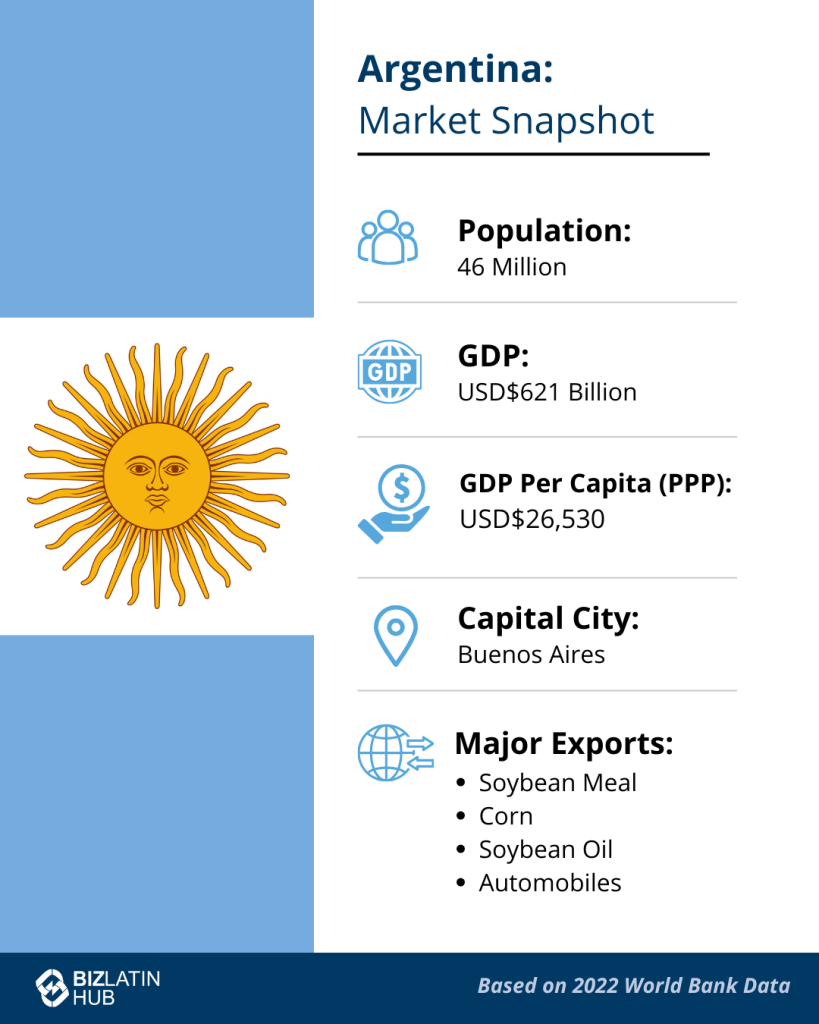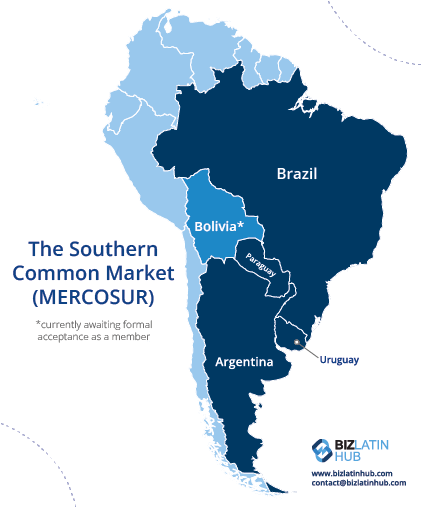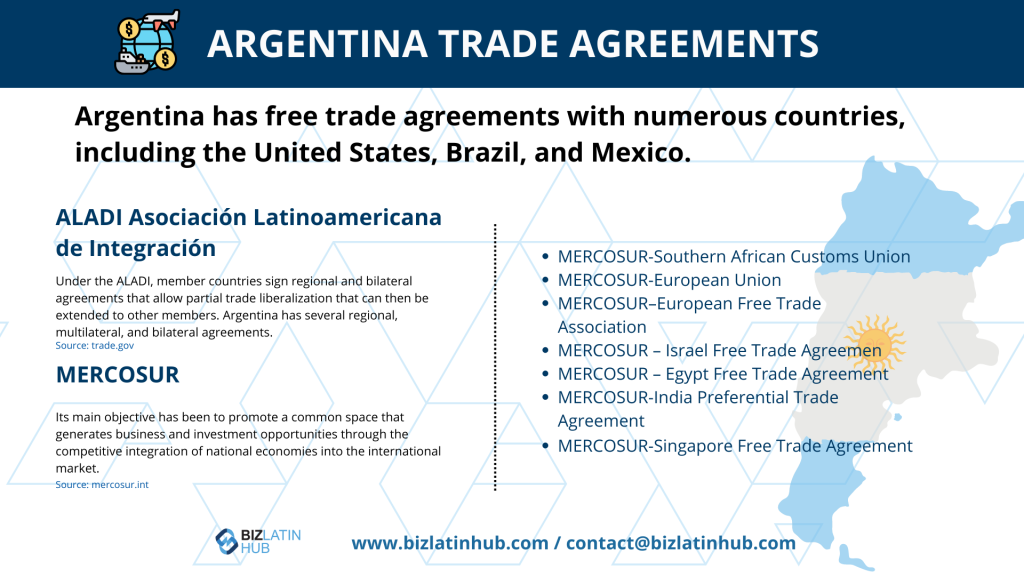Historically, free trade agreements in Argentina have not been part of the psyche of local governments. It has traditionally been a nation with an inward-looking business environment, following a set of protectionist laws and regulations. Since 2015, however, the country has been opening the doors to international business.
Though Argentina has been part of regional trade groups and global trade blocks for a long time, its role has been more passive than active. The most important of the free trade agreements in Argentina is undoubtedly the Mercosur agreement, alongide the extraordinary leniency the country receives from the World Bank and WTO.
Biz Latin Hub can help you take advantage of the opportunities that free trade agreements in Argentina bring to the table and help you unlock this large and potentially lucrative market. Our dedicated Buenos Aires office can help with company formation in Argentina as well as making sure you stay fully complaint with local law.
Free trade in Argentina: World Trade Organization
One of these trade blocs is the World Trade Organization (WTO). Argentina has been a part of the WTO since January 1995. Whilst being a long-term and well-integrated member, Argentina has generally taken a back seat in its activity.

However, in 2017, Macri successfully organized for the WTO’s ministerial conference to come to Argentina for the first time. By opening its arms to the world’s largest trade group, Macri achieved a monumental political triumph; sending a signal to the world that Argentina is open for business and welcoming foreign investors gladly.
More significantly, however, 2017 also brought about Argentina’s signing of the WTO’s Trade Facilitation Agreement, becoming the 128th WTO member to do so. The agreement pledges to reduce red tape, simplify and modernize all trade between WTO members with the aim of decreasing global trade costs by 14.3%, roughly USD$1 trillion per year.
The signing of this pledge shows Argentina’s determined intent to integrate itself further into the fabric of global trade and international business.
MERCOSUR trade relations
Argentina is one of the original members of the MERCOSUR trade group. Other full members include Brazil, Paraguay, and Uruguay. The MERCOSUR trade group, being the world’s third-largest integrated market, is without a doubt the most important trade group Argentina is part of, being responsible for most of its trade in and out of the country.

Much of Argentina’s trade is facilitated through the multilateral deals embedded in the MERCOSUR. The bloc has free trade agreements with Mexico, Peru, India, Egypt, Israel and most recently, the European Union.
Macri has aimed to bring Argentina more comprehensively into the MERCOSUR fold. During his term as president ‘pro tempore’ of the group, he was active in promoting the agenda of the trade group saying “we are going to increase our ongoing negotiations in the MERCOSUR, and develop new ones that generate global value chains. We want to give more opportunities to our companies, SMEs and entrepreneurs”.
He added that MERCOSUR will “continue to make progress in convergence with the Pacific Alliance, as this will allow us to build a more productive region, with coasts on two oceans, helping it become one of the most dynamic hubs for growth in the world.”
His determined narrative of advocating Argentina’s integration in the regional trade group is something he hopes will encourage Argentinians to see the potential and opportunity international trade brings.
MERCOSUR – European Union
Apart from Brazil, the EU is currently the destination for the largest proportion of Argentina’s exports (13.4%). After discussions lasting almost 20 years between the two trade blocs, a deal was finally struck on 28 June 2019. The agreement was signed by MERCOSUR president Mauricio Macri and president of the EU Commission, Jean-Claude Juncker.
Upon ratifying the agreement, Macri stressed that “the MERCOSUR agreement with the EU is the most important in our history”. The deal connects 780 million people together and eliminates billions of dollars worth in tariffs, making it one of the largest and most significant trade agreements ever struck.
The agreement’s most significant overhaul was the change in the import and export laws of agricultural produce; provoking objection from European farmers but creating opportunity from Latin America’s. Having reduced tariffs on produce from Latin America, namely wine and beef, Argentinian farmers have another huge consumer base for their products.
MERCOSUR – India trade agreement
Another major trade agreement with the Latin American trade group is the India – MERCOSUR preferential trade agreement. Coming into effect from June 2009, the deal had the ultimate goal of granting reciprocal fixed tariff preferences. After 6 rounds of negotiating, the two groups agreed to a list of 450 products each that would receive reciprocal tariff reductions.
From India, these products included rubber and tires, plastics, pharmaceuticals, spices and machinery items. From the MERCOSUR, tariffs were reduced on meats, raw hides and skins, leather, wool, cotton, and iron.
Argentina’s benefit from this comes specifically in the goods of meat, raw hides and leather, of course being famous for its beef production.

Argentina – Chile bilateral free trade agreement
In March 2019, president Piñera from Chile and Macri from Argentina got together to celebrate the ratification of the new trade deal between the two nations named ‘Protocol 61’.
Argentina and Chile share one of the longest land borders in Latin America yet have always have struggled on the trade deal front. Protocol 61 is the most encompassing trade deal between the two nations to date. It extensively covers the trade of goods, services, and investments; what their tariffs are and what the legal requirements are.
The agreement goes on to outline labor laws between the two countries and even establishes a shared environmental policy. It also includes the deregulation of a whole host of economic activities, most significantly e-commerce, making goods in both nations far more easily obtainable. Possibly the most significant aspect of the agreement, however, is the chapter on the ability for companies in each of the two nations to bid on one another’s public contract tenders. This is a huge leap forward for Argentina in particular to allow Chilean companies to operate on government-level contracts.
6 months on from the ratification of the agreement, both nations are benefitting. The majority of trade occurring at the moment is within the foods industry where Argentinian farmers are getting better prices for their produce over the border as a result of their recent economic situation.
FAQs on free trade agreements in Argentina
Argentina is one of the original members of the MERCOSUR trade group. Other full members include Brazil, Paraguay, and Uruguay. The MERCOSUR trade group, being the world’s third-largest integrated market, is without a doubt the most important trade group Argentina is part of, being responsible for most of its trade in and out of the country.
In March 2019, president Piñera from Chile and Macri from Argentina got together to celebrate the ratification of the new trade deal between the two nations named ‘Protocol 61’.
Argentina and Chile share one of the longest land borders in Latin America yet have always have struggled on the trade deal front. Protocol 61 is the most encompassing trade deal between the two nations to date. It extensively covers the trade of goods, services, and investments; what their tariffs are and what the legal requirements are.
Argentina has been a part of the WTO since January 1995. Whilst being a long-term and well-integrated member, Argentina has generally taken a back seat in its activity.
Yes, this is fully legal. However, you will need a local resident to act as a legal representative.
Biz Latin Hub can help you with free trade agreements in Argentina
Argentina is the fourth-largest economy in Latin America and is more accessible than ever to investors. To take advantage of this window of opportunity, investors will need a knowledgeable partner to navigate Argentina’s complex company formation process.
Biz Latin Hub have legal and accounting experts all across Latin America. Our services specialize in foreign company incorporation and market entry strategies. Contact us now to discuss your Argentinian opportunity.
Learn more about our team and expert authors.






